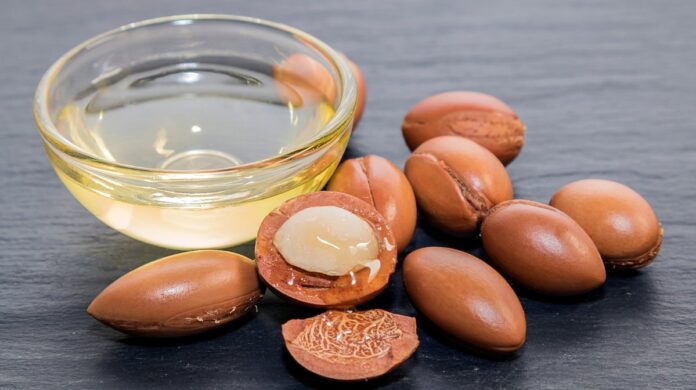Introduction

Argan oil, often referred to as “liquid gold,” has been a staple in Moroccan beauty routines for centuries. Extracted from the nuts of the Argania spinosa tree, native to southwestern Morocco, argan oil is prized for its remarkable versatility and nourishing properties. This natural oil has found its way into many skincare, haircare, and culinary products due to its numerous benefits. However, like any natural product, it’s essential to understand its different forms, benefits, and potential side effects.
Forms of Argan Oil
Argan oil is typically available in three main forms:
- Cosmetic-grade Argan Oil: This is the most common form used in skincare and haircare products. It is cold-pressed to retain the highest amount of beneficial nutrients. The oil has a light texture and is rich in vitamin E, antioxidants, and fatty acids. Cosmetic-grade argan oil is commonly found in moisturizers, serums, shampoos, conditioners, and other beauty products.
- Culinary-grade Argan Oil: Unlike its cosmetic counterpart, culinary-grade argan oil is specifically designed for consumption. It is roasted before being pressed, which gives it a unique, nutty flavor. Culinary-grade argan oil is used in Moroccan cooking to enhance dishes like salads, couscous, and tagines, as well as in dips and dressings.
- Haircare and Skincare Blends: Many products combine argan oil with other beneficial ingredients like aloe vera, jojoba oil, or coconut oil to enhance its effectiveness. These blended oils may target specific skin or hair concerns, such as dry scalp, frizzy hair, or sensitive skin.
Benefits of Argan Oil
Argan oil is often regarded as one of the most nourishing oils for both skin and hair. Here are some of its primary benefits:

1. Moisturizes Skin and Hair:
The high content of essential fatty acids (particularly oleic and linoleic acid) in argan oil makes it an excellent moisturizer. It can deeply hydrate the skin without clogging pores, making it beneficial for both dry and oily skin types. When used on hair, it helps to restore moisture, leaving it smooth and shiny.
2. Anti-aging Properties:
Argan oil is rich in vitamin E, a potent antioxidant known for its anti-aging benefits. Vitamin E helps fight free radicals that contribute to premature aging, reducing the appearance of wrinkles, fine lines, and age spots. This makes argan oil a popular ingredient in anti-aging serums and creams.
3. Promotes Hair Health:
Argan oil nourishes the hair from root to tip, helping to restore shine and softness. It is often used to treat dry, damaged, and frizzy hair. Additionally, the oil can promote scalp health by reducing dandruff and preventing dryness or irritation.
4. Reduces Acne:
While it may seem counterintuitive to use oil for acne-prone skin, argan oil can actually help balance sebum production. Its non-comedogenic nature (it doesn’t clog pores) makes it ideal for controlling oil without exacerbating breakouts. Additionally, its anti-inflammatory properties can soothe irritated skin and reduce the redness and swelling associated with acne.
5. Improves Skin Tone:
Regular use of argan oil can help even out skin tone and texture. It has been shown to reduce the appearance of scars, stretch marks, and pigmentation irregularities. The oil’s moisturizing properties also keep the skin soft and smooth.
6. Nourishes Nails and Cuticles:
Argan oil is an excellent remedy for brittle nails and dry cuticles. Massaging a few drops into the nails and cuticles can improve nail strength and prevent cracking and peeling.
Side Effects of Argan Oil
Though generally considered safe for most people, argan oil can cause some side effects, particularly if used improperly or in excessive amounts. Here are some potential risks:
1. Allergic Reactions:
As with any natural product, it’s essential to perform a patch test before applying argan oil to the skin or scalp. Though rare, some individuals may experience allergic reactions, such as redness, itching, or hives. If any of these symptoms occur, it’s important to discontinue use and consult a doctor.

2. Oily Skin Sensitivity:
Although argan oil is non-comedogenic, some individuals with extremely oily skin may find that the oil exacerbates their oil production. It’s important to use a small amount initially and assess how your skin reacts before incorporating it fully into your skincare routine.
3. Interaction with Other Products:
When combined with other strong active ingredients, such as retinoids or chemical exfoliants, argan oil may cause irritation or sensitivity. It’s advisable to avoid layering multiple potent products on the skin without proper guidance from a dermatologist.
4. Ingestion Concerns:
While culinary-grade argan oil is generally safe for consumption, consuming too much can lead to digestive discomfort. It’s important to use the oil in moderation when incorporating it into food. Excessive intake may cause stomach upset or diarrhea.
This Article is for Basic Information. Contact a professional doctor before using it.
HAKEEM KARAMAT ULLAH
+923090560000




